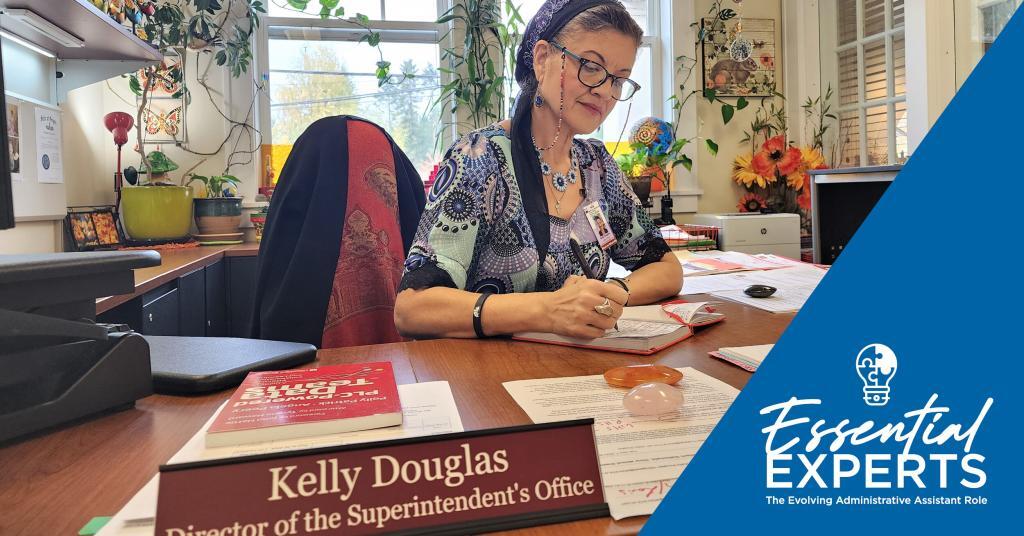
Kelly Douglas received the new title this school year of director of the superintendent’s office, recognizing her cabinet-level work for the West Linn-Wilsonville School District. (Photo courtesy of Kelly Douglas)
“Director of the superintendent’s office” has a nice ring to Kelly Douglas’ ears. It sounds a little like breaking a glass ceiling to her.
Before the start of this school year, her old title with the West Linn-Wilsonville School District read: executive and board assistant. What’s in a name? The new one recognizes the cabinet-level responsibilities she was already addressing.
“This title validates the level of service I’m providing the West Linn-Wilsonville School District,” Douglas said.
The assistant position for superintendents and school boards carries a wide range of often complex duties. As the responsibilities have increased in some districts, the position title has also changed, from secretary to assistant to administrative professional. An occasional OREdNews series, “Essential Experts,” examines the evolving role of administrative professionals – regardless of exact title – in school board administration.
Jenn Nelson, OSBA Board Development senior administrative assistant, said a title is important for creating expectations. Although many people are proud to be called secretaries, for some it calls to mind tasks such as making copies and bringing coffee. Administrative professionals often still do those tasks,
but some are also taking on research, advisory roles, community outreach and committee leadership in addition to guiding the arcane parliamentary procedures of school board meetings.
Douglas was an office manager before going to work in 1998 at Molalla High School, where she was a school garden coordinator and Russian language outreach specialist among other roles.
She took the West Linn-Wilsonville executive assistant role in 2015. Now, in addition to being part of the superintendent’s 11-member cabinet, she serves on the District Office Administration Equity Team and leads three professional learning communities she created for administrative professionals. She provides expertise on public records law and implementation of school policies.
She continues to promote school gardens around the state as well as giving presentations on maintaining joy in public education work. She is a fixture in the Oregon school community, providing a public face for the district.
Douglas created many aspects of her current job as she spotted needs, then filled them.
“If you want to elevate yourself within the profession, take it upon yourself to create opportunity,” she said.
Douglas spent weeks preparing her proposal for a title change, including documenting her many duties. She encourages other administrative professionals to accurately assess what they do, noting where they are performing added duties.
She encourages assistants to talk to their superintendents about expectations, goals and additional responsibilities.
One of the most important aspects of Douglas’ job, she says, is acting as a bridge between the board and the administration. She also takes seriously making sure board members are comfortable and prepared to do the work.
“We want them to feel honored and appreciated because it is a volunteer position away from their beloveds on behalf of students,” Douglas said.
Nelson said boards spend a lot of time thinking about their relationship with the superintendent but they should also be looking at their relationship with their assistant.
“You can’t hold a board meeting without an assistant,” she said.
Douglas hopes her new title can inspire others and open a door for nonteachers to achieve a director’s role where they can put their school experience into practice.
Nelson agreed that Douglas has forged a path for school administrative professionals. Nelson is working to create a supportive network for school administrative professionals, similar to other fields.
Nelson would like to see more professional development and an accreditation program to recognize their learning.
West Linn-Wilsonville Superintendent Kathy Ludwig said Douglas’ new title did not come with a raise or a change in job duties. Instead, Douglas’ title change is intended to reflect the work she is already doing: “Less around assisting, she is also doing quite a bit of directing and coordinating,” Ludwig said.
Ludwig said she respects Douglas as a colleague and considers her a confidante, someone she can rely on for professional opinions. Ludwig said it helps to have Douglas involved in the decision-making because she is often the first point of contact for parents and community members.
West Linn-Wilsonville Board Chair Louis Taylor said Douglas is always accessible, helping new board members get up to speed.
“You could ask her the dumb question or the question everyone else knows,” he said. “She allows you to come right in and get traction.”
Taylor said board members can also ask Douglas tough questions on case law and school procedures because she has seen the district’s previous actions and their results.
“She is not going to tell you what to do, but she is going to tell you the outcome of a scenario,” he said.
Taylor said having a cabinet-level-worthy person assisting the board should be every district’s goal.
“If they don’t have a Director Douglas on their team, they are missing out on what the board experience can be,” he said.
Jake Arnold, OSBA
jarnold@osba.org